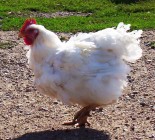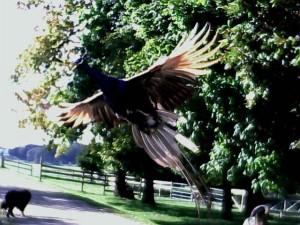Third Times The Charm
Over the past several years we have raised broilers (chickens) organically for various people. We have a broad client base across a sixty mile area and generally raise between fifteen hundred and two thousand chickens. After maturity they are gathered up and taken to a facility about an hour from the house for processing. Of course, we have to pick them up and deliver them to our clients.
Each year is a new challenge not just in regard to the weather conditions but to the quality of the chickens we purchase. When we first got into the business we purchased Jumbo Cornish Rock chicks. Just for the record everyone in the industry refers to meat chickens as broilers not by their proper name. These birds have been cross-bred to produce a fast growing bird (eight to twelve weeks to maturity) and have a substantial amount of breast meat. The fact of the matter was that these birds rarely live past ten weeks. The first year we purchased them, I had to guarantee my daughter that they had a very short life expectancy. In point of fact, we found that these birds grew so fast and got so big that their hearts would give out if the temperature got above ninety degrees. Many had legs that got huge and resulted in difficulty walking. Even though ours are free in a pasture many times they would never move from the feeder. If it rained they would sit in a puddle of water and drown. Through the years the problems got worse.
Then one year we had great deal difficulty with our chicks. Many developed leg problems and died before they left the brooder others just did not grow, after eight weeks they weighed no more than two pounds while still others grew to a gargantuan size of nine pounds in eight weeks. It became apparent that something had gone array in their breeding. Sure enough, we were not the only ones experiencing problems, word was that the strain had extinguished itself. And so, the next year a new strain of the Cornish Rock came on the market.
When the chicks were delivered the first thing we noticed was that these guys were spunky. We lost virtually none in the brooder or out in the field. They were the healthiest, happiest birds I had ever seen. Many would peck and scratch the dirt just like our laying hens did. Seeing how much they were like our heritage stock, I tacked on an extra week of growing time because I was concerned that we would not reach our desired weight in that time period. After all many times the heritage stock reached only three pounds and we were looking for an average processed weight of five pounds. It is from this stock that Princess or Fat Lady, as my husband calls her, came to live at the farm.
As always the first brooder group (when they are three weeks old) went to the front pasture because it is high ground and it is the warmest pasture. Often times the weather is wet and chilly in May and June here in Minnesota. Now, to get to this pasture one must go through the compound, past the house and through another pasture. It is quite a distance. This particular year the weather was so wet that we did not move the chicks out until they were four weeks old. Two days later my husband found one of these chicks running from one of the hens in the barn. He marked the bird and took it back out to the front pasture. Three days later, it was back in the barn.
Now my daughter and I have a tendency to take a fancy to some of the livestock and then my husband is unable to sell the loved one. So that night at dinner, he brought up the subject of the chick along with a lecture on what a short life expectancy these birds have and that we really can not be keeping the broilers. My daughter and I looked at each other and shook our heads, we had not kept any of the broilers. This, of course, led to a jolly time as we teased him about his pet broiler. We finished the conversation by telling him that if she came back to the barn a third time, she was a keeper. Sure enough two days latter she was in the barn again.
Over the next few weeks my husband grew very attached to her. In fact, he allowed her to live in the feed room until she got big enough to defend herself. She is now two years old and follows whoever is feeding around the barn. However, she is especially fond of my husband. It is only for him that she clucks and talks. She also trails after him whenever she sees him, telling him about all the shenanigans that have gone on when he was not there.
Then one year we had great deal difficulty with our chicks. Many developed leg problems and died before they left the brooder others just did not grow, after eight weeks they weighed no more than two pounds while still others grew to a gargantuan size of nine pounds in eight weeks. It became apparent that something had gone array in their breeding. Sure enough, we were not the only ones experiencing problems, word was that the strain had extinguished itself. And so, the next year a new strain of the Cornish Rock came on the market.
When the chicks were delivered the first thing we noticed was that these guys were spunky. We lost virtually none in the brooder or out in the field. They were the healthiest, happiest birds I had ever seen. Many would peck and scratch the dirt just like our laying hens did. Seeing how much they were like our heritage stock, I tacked on an extra week of growing time because I was concerned that we would not reach our desired weight in that time period. After all many times the heritage stock reached only three pounds and we were looking for an average processed weight of five pounds. It is from this stock that Princess or Fat Lady, as my husband calls her, came to live at the farm.
As always the first brooder group (when they are three weeks old) went to the front pasture because it is high ground and it is the warmest pasture. Often times the weather is wet and chilly in May and June here in Minnesota. Now, to get to this pasture one must go through the compound, past the house and through another pasture. It is quite a distance. This particular year the weather was so wet that we did not move the chicks out until they were four weeks old. Two days later my husband found one of these chicks running from one of the hens in the barn. He marked the bird and took it back out to the front pasture. Three days later, it was back in the barn.
Now my daughter and I have a tendency to take a fancy to some of the livestock and then my husband is unable to sell the loved one. So that night at dinner, he brought up the subject of the chick along with a lecture on what a short life expectancy these birds have and that we really can not be keeping the broilers. My daughter and I looked at each other and shook our heads, we had not kept any of the broilers. This, of course, led to a jolly time as we teased him about his pet broiler. We finished the conversation by telling him that if she came back to the barn a third time, she was a keeper. Sure enough two days latter she was in the barn again.
Over the next few weeks my husband grew very attached to her. In fact, he allowed her to live in the feed room until she got big enough to defend herself. She is now two years old and follows whoever is feeding around the barn. However, she is especially fond of my husband. It is only for him that she clucks and talks. She also trails after him whenever she sees him, telling him about all the shenanigans that have gone on when he was not there.
Rivers Critters Ranch, LLC
We own and operate Rivers Critters Ranch, LLC, which was founded in 1997. As the name suggests the farm belongs to the animals we seem to be just the caretakers.
Learn more |
About Us
This site is dedicated to those of us who have dream to farm. Inside you will find information, stories, pictures and advice outlining the experiences of a city born family who acted upon the dream to move to the country and live on a farm. Join us as we share our adventures!
Learn more |
News and Events
Hobby Farm Dreams continues to grow.
Learn more | | 



